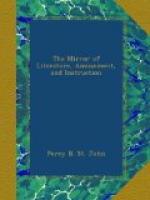“Oh, I will love thee, ev’n
in madness love thee,
Tho’ my distracted senses should
forsake me!
Tho’ the bare earth be all our resting
place,
Its roots our food, some cliff our habitation,
I’ll make this arm a pillow for
thy head,
And as thou sighing ly’st, and swell’d
with sorrow,
Creep to thy bosom, pour the balm of love
Into thy soul, and kiss thee to thy rest.”
This is a true and beautiful picture of constancy of mind, under those rude blasts of adversity, which too frequently nip the growth of affection. The only alternative against a decay of passion on such occasions, is a sufficient portion of virtue, strong and well-grounded love, and constancy of mind as firm as the rock. In short, without constancy, there can be neither love, friendship, nor virtue, in the world.
J.P.
* * * * *
CAVE AT BLACKHEATH.
(To the Editor of the Mirror.)
Allow me to hand you an account of a very curious cavern at Blackheath, fortuitously discovered in the year 1780, and which will form, I have no doubt, a pleasing addition to the valued communication of your correspondent Halbert H., in the 348th Number of the MIRROR, and prove interesting to the greater portion of your numerous readers. It is situated on the hill, (on the left hand side from London,) and is a very spacious vaulted cavern, hewn through a solid chalk-stone rock, one hundred feet below the surface. The Saxons, on their entrance into Kent, upwards of 1,300 years ago, excavated several of these retreats; and during the discord, horrid murders, and sanguinary conflicts with the native Britons, for nearly five hundred years, used these underground recesses, not only as safe receptacles for their persons, but also secure depositaries for their wealth and plunder. After these times, history informs us the caves were frequently resorted to, and occupied by the disloyal and unprincipled rebels, headed by Jack Cade, in the reign of Henry VI., about A.D. 1400, who infested Blackheath and its neighbourhood, (as also mentioned by your correspondent;) since then by several banditti, called Levellers, in the rebellious times of Oliver Cromwell. The cave consists of three rooms, which are dry, and illuminated; in one of which, at the end of the principal entrance, is a well of soft, pure, and clear water, which, according to the opinion of several eminent men, is seldom to be met with. The internal structure is similar to the cave under the ruins of Reigate Castle, built by the Saxons; where the barons of England, in the year 1212, with their followers, (frequently amounting to five hundred persons,) held their private meetings, and took up arms, previous to their obtaining Magna Charta at Runny Mead, near Egham, in Surrey.
C.J.T.
* * * * *




